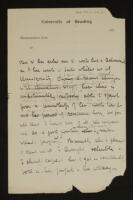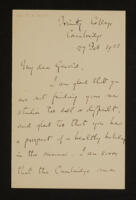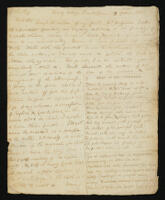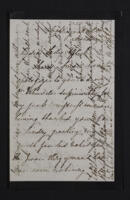The envelope is marked ‘Lord P-Ls | Diary | READ’ and ‘India—Australia—Japan | nearly a year’s travel'. These notes may have been written by Vera Brittain when she was working on Pethick-Lawrence’s biography.
Barn Elm. Requires tar line or rope yarn, twine of varying strength and a pound of snuff "to assist the brains in their operation"
Boschbeck, Boshof Avenue, Newlands, Cape Town.
Boulogne-sur-Mer.—Boulogne-sur-Mer.—Reports the results of her meeting with Mrs Tuke, Annie, and Christabel in connection with the separation of the Pethick-Lawrences from the WSPU.
(Typed transcript.)
—————
Transcript
COPY.
Boulogne sur Mer.
September 8th, 1912.
My dear Mrs Lawrence:—
It is during a breathing space such as we have had that one is able to quietly take stock of the situation and see things in their true perspective and this I have been doing. No doubt you and Mr Lawrence have also been thinking much about the Union and its work. We, Mrs Tuke, Annie, Christabel and I have met here and had a long talk and as a result I write you this letter which embodies our views. I want you to regard it as a business letter and to realise that in all our hearts are feelings which are very deep and real but which it would be out of place to express here.
First let me tell you how matters stand.
1. Of course you have been kept informed of the Government’s proceedings to recover the costs of the prosecution and how after much effort the sale at Holmwood has been for a time postponed.
2. I enclose a letter claiming compensation which has been answered to the effect that we are travelling abroad. This claim is likely to be followed by others.
3. The new premises are nearing completion. Mrs Tuke and I return to London next week to superintend furnishing and removal. Before going to Evian-les-Bains for our cure we deposited with the solicitor, Mr Blount, a sum of money to cover the rent for three years so that the guarantors are now entirely protected against possible loss.
4. Christabel leaves Boulogne next week to establish herself in Paris. It is commonly known who she is and where she is and so we have decided that it is better she should be in Paris the seat of French Government, where she will be in touch with the representatives of the English Press and also that the moment has come for her to resume her own name and live quite openly. She will now sign her articles and letters.
Now as to the situation as it seems to us to affect you and Mr Lawrence, and your position in the Union as Treasurer.
It is quite evident that the authorities and also the Insurance Companies and property owners mean to take full advantage of the fact that they can attack Mr Lawrence with profit and through Mr Lawrence weaken the Movement. So long as Mr Lawrence can be connected with militant acts involving damage to property, they wil make him pay. Nothing but the cessation of militancy, (which of course is unthunkable† {1} before the vote is assured) or his complete ruin will stop this action on their part. They see in Mr Lawrence a potent weapon against the militant movement and they mean to use it. This weapon is a powerful one. By its use they can not only ruin Mr Lawrence, but they also intend, if they can, to divert our funds. If suffragists, feeling strongly as they do, the injustice of one having to suffer for the acts of others, raised a fund to recoup Mr Lawrence, it would mean that our members[’] money would go finally into the coffers of the enemy and the fighting fund would be depleted or ended. It would also reduce militancy to a farce for the damage we did with one hand would be repaired with the other. It is well to see things at their very worst especially when the very worst is not only possible but highly probable. In one night, by one militant act, hundreds of thousands of pounds might be involved and the only individuals in the Movement who would be affected apart from imprisonment of those responsible would be you two. So long as you are a responsible official of this Union this will be so. Then there is the Albert Hall Meeting. What we say at that meeting is of vital importance. I know that it will be my duty as Chairman to make a militant speech, a speech that will lead to further acts of reprisal on the part of the Government if it is followed, as it will be, by a fresh outbreak of militancy. No doubt there will be another prosecution for conspiracy in which those who share responsibility with me will be involved. The Gov. can only take me when they proceed against me and that will do them more harm than good but in taking you they repeat the money getting process. I know you will understand me when I say that if to ruin Mr Lawrence would help the Woman’s Cause I should think it worth while for what is the individual as compared with the Cause? When however far from helping it is a source of weakness, a positive injury, then the case is different! What is to be done?
This is what we suggest after long and anxious thought. It is a way of retaining your active participation in a great Imperial Movement which is just beginning and at the same time of preventing the Government from striking at the militant Movement in England through you. The Union has paved the way by my two visits to Canada, by the establishment of the first W.S.P.U. there, by the presence of scattered members and by the deputation to Borden. Will you for a time lead the Imperial Suffrage Movement in Canada? It is a great mission and a great role. The Government would get a huge rebuff. Like all their previous acts of tyranny this latest one would recoil on their own heads and they would find that instead of crushing the Movement in England by attacking you they had actually helped to spread it throughout the Empire. We have often felt in this Movement that we were guided in a mysterious way. Perhaps the events and trials of the past few months have been preparing us for greater developments. You can do this work. For me to undertake it would not change the situation here for the difficulties and dangers would still remain.
Following on the deputation to Borden we are sending Miss Wylie (whose brother is a Canadian M.P.) to organise our scattered members. We are endeavouring to get together a special Canadian Fund to launch the Campaign. The growing importance of Canada makes a W.S.P.U. Movement there imperative even if you do not agree to control and guide it.
Of course you might decide to carry out the project of foreign travel of which you have so often talked. All that I have written is with the full approval and concurrence of our friends who share my anxieties and hopes. Please show my letter to Mr Lawrence and discuss it with him and believe that I have left unwritten many expressions of affection and appreciation which we all feel very deeply. I hope your holiday has been a pleasant one. It must have been a great joy . . . . . . . . . . . . . . . . . . . . . . . .
I send this letter to New York in the hope that you may get it before sailing.
Very affectionately yours,
(Signed) E. Pankhurst.
——————
A typed transcript.
{1} Followed by a superfluous closing bracket.
(Carbon copy.)
Account of part of a visit to South Africa, headed ‘Third Encyclical’.
—————
Transcript
Third Encyclical
I write from on board the Scot on the homeward journey; a tedious voyage; a more tiresome set of passengers than are here assembled I think it would be difficult to imagine—at least those in the first class—but of that anon.
The remainder of my time spent in Cape Town passed along pleasantly enough. I forget whether I told you that in front of the Railway Station were always gathered a number of mining refugees from the Transvaal who sat upon the railing and smoked. So one evening I put on my worst looking attire and joined them. By dint of smoking a great number of pipes I managed to get a very fair view of the situation, from a new point of view. As Schreiner said to me “The question is like a diamond with many facets”—Well I was looking at a fresh facet.
Another morning I went & saw the Editor of the Cape Times who is a member of the Imperialist side of the Cape House; another day I went & saw a doctor—Doctor Beck—who is on the other side; & after lunching with him, I went to a minister of the Dutch Reformed Church—an interesting man of distinctly Huguenot origin. From all these I learnt much, & of course it must seem rather unsatisfactory to you that I don’t make some attempt to give you their opinions, but really it is practically impossible. In the first place one has not the right, to say nothing of the ability, to repeat on paper very much of a private conversation; & even if one could, the absence of the personal element would render the attempt more or less abortive. All I can say it that from those I have mentioned, from Hofmeyr, from ex miners of Johannesburg & from numbers of others, from my frequent visits to the House of Assembly—to say nothing of people on board this ship who come from both camps—I think I have got a pretty comprehensive knowledge, both as to the actual state of facts, and as to the actual state of mind which prompted the various actors in the great drama to take up the positions which they actually did. As to the state of feeling to-day it is of course very much harder to speak with certainty, because as a matter of fact no one knows absolutely & each person has a natural race,—class,—interest,—sentimental bias impelling him not only to say but to think in a certain direction.
I may as well say at once that the result of my investigation has been to confirm me in my views; to enable me to sort out the tangible & intangible grievances of the English Outlander population & to estimate how far these stood a chance of redress in case a less violent policy had been adopted; & also to comprehend to some extent the inter-racial position in the Cape Colony; & to form a knowledge of the conduct of the belligerents in the war.
This is not the place to enter into a detailed defence of my views or to attempt to lay down any line of policy, but I may say that I have weighed very carefully in my mind the question of how far any line of opposition to the government tends to encourage the enemy in a futile resistance. I do not think I minimise for a moment the gravity of this contention, or the responsibility which rests upon those who in spite of it, take up a line of active opposition. At the same time I am convinced that the proper thing to do is to actively oppose the government, if for no other reason but because I believe that the only hope to save South Africa lies in the continuance of something of a party, at any rate, at home, who have not been led away by the present state of public opinion.—But to set out the whole case would lead to a very much longer statement that† can be conveniently put down in an encyclical. So let us leave the war question out for the rest.
I enjoyed my stay in Cape Town & made a number of friends; my project to ascend Table Mountain never came off, but one day a party of us drove right round it in a four horse wagonette & had a very jolly time—it was the same round that I think I described to you I had taken on my bicycle—taking up the whole day & stopping at one of the bays to have lunch and a bathe. Cape Town is situated in a peninsular & the drive round is—I think—practically the drive round the peninsular; and the views of the different bays in sight of which one comes from different points are very grand. The weather in Cape Town was very much as it had been in Sydney when I was there; short days but generally sunny & bright like an English September, just the sort of weather that it is pleasant to be about in. Some of the people who had come out on the boat with me stayed some little time in Cape Town & I sometimes saw something of them. I went out on one occasion to dine with some at Queen’s Hill, Seapoint, 3 or 4 miles out of the town and taking my music with me (as I was directed) we had a musical evening & a good deal of boat reminiscences.
I should have said that Seapoint is one of the most beautiful suburbs & I often used to go out there on my bicycle before breakfast to see the waves coming in—I believe I mentioned this in my last encyclical.
As to the Cape Parliament, I think I saw & heard most of the principal people, but I was sorry that Rhodes was away all the time; by the way I heard the other day that he has never learnt to speak or understand Dutch! Anyone is admitted tot he debates, but if you have a speaker’s ticket you are able to get a very much better place; it is only recently that there has been much crowding on the part of the general public. Hitherto a scab act has been perhaps the most exciting sort of thing which has been passed.
(With an envelope.)
—————
Transcript
Trinity College | Cambridge
22 Nov. 1935
Dear Semple,
Your letter found me in a nursing home, whence I issued forth three or four days ago. My heart can no longer sustain the 44 steps to my rooms in Whewell’s Court, and I have had to descend to the ground floor in the Great Court. Ever since June I have been very weak. I have lectured however all this term, motoring in from the Home.
I was sorry that you had missed the award, though the ladies will probably be smitten with Onians {1}. I have no distinct idea of his work, and I am afraid that I had never been conscious of Williamson’s existence.
Yours sincerely
A. E. Housman.
[Direction on envelope:] W. H. Semple Esq | 29 Upper Redlands Road | Reading
—————
The envelope, which bears a 1½d. stamp, was postmarked at Cambridge at 8 p.m. on 22 Nov.
{1} The chair of Latin at Bedford College, a women’s college in the University of London, had fallen vacant on the death of the incumbent, Harold Williamson, on 7 June. Semple evidently applied for the post, but it was awarded to R. B. Onians.
(With an envelope.)
—————
Transcript
Trinity College | Cambridge
27 Feb. 1933
My dear Gerald,
I am glad that you are not finding your new studies too dull or difficult, and glad too that you have a prospect of a healthy holiday in the summer. I am sorry that the Cambridge men at St Thomas’s are ‘very bisexual’, but perhaps that is only your handwriting. Your ‘Outline’ I am pleased to see in print {1}, though to me the geology of N’Changa remains obscure.
The Lent races are just over, in which Third Trinity was bumped by Fitzwilliam Hall, a disgrace unknown in history. Such things however do not affect my health, which is good now that I have got rid of a rather long cold.
No, I am not likely to be embarrassed by want of funds when taking my holidays.
Your affectionate godfather
A. E. Housman.
[Direction on envelope:] G. C. A. Jackson Esq | Medical School | St Thomas’s Hospital | S. E. 1
—————
The envelope, which bears a 1½d. stamp, was postmarked at Cambridge at 10.15 p.m. on 27 February.
{1} ‘Outline of the geological history of the N’Changa district, Northern Rhodesia’, published in the Geological Magazine, lxx (1933), 49–57.
Royal Observatory Greenwich - GA has been reading WW's work on tides 'with great pleasure and profit'. He gives an outline of queries he finds between various collected observations - especially around the coast of Britain and parts of Europe - and theory.
Grosvenor House, Park Lane, London, W.1.—Is about to leave for India. Thanks her for a lovely evening, and refers to their common experience of struggling for great causes.
87 Clement’s Inn, W.C.—Expresses his love for her and his reliance upon her.
Slough - JH has received 'a note from Lord Melbourne saying that he shall be happy to receive our Committee' but does not say when he will return to London. JH has heard that he has been named in the Courier as the probable successor to H.R.H. the Duke of Sussex to the Chair of the Royal Society - WW must put 'an absolute negative to any such report'.
Gives an account of yesterday’s (Cecil Houses) Finance Committee meeting, which concluded amicably.
National Library of Scotland.—Replies to his queries about a payment of expenses (see 3/37), and refers to the death of Dr Meikle.
Asks for her help in securing a position for Yella Hertzka as the head of a training colony to equip German refugees for agricultural work overseas.
—————
Transcript
10th. May. 1939.
Dear Miss Fry,
I am very sorry you are not able to be with us on June 6th, but of course I realize how extremely busy you are.
I feel I must apologise to you for what I am going to do. I want to appeal for your consideration on a very special case and if possible I want you to give your help, although I know that you are already overwhelmed with all kinds of problems.
Mrs. Yella Hertzka of Vienna (an agricultural expert) is a refugee in England. She has been a leading spirit in the Women’s International League for Peace and Freedom since 1918 and is a very gifted and effective person. Her main qualification is that of a creative garden and farm architect. She has been the head of a horticultural college in Vienna for twenty or thirty years, has travelled largely and understands soil and climate and how to bring virgin soil under cultivation, as well as how to arouse the enthusiasm of ignorant and hopeless people. In addition to this technical knowledge, she has a very brillliant† temperament and is a born leader.
All this information is leading up to this one point. Frau Hertzka is exactly the right person to put in charge of a German Refugee Training Colony which is to equip men for pioneer agricultural work in distant lands, and it seems to those who know her a tragic waste of her of special qualifications not to use her in this capacity. I know that the chief farm colonies are run by the Friends Society and that is one reason why I am writing to you as a friend. I know that they are very short of money; I know that they are under a sort of obligation to employ British gardeners and so forth, but if you could meet Frau Hertzka, I think that you would recognise that she would be a unique asset to any farm training scheme. She does not want any more than just enough to live on; she is passionately content with the country and with the work on the land, but she does want freedom to organize so that she may carry out, so far as funds will allow, her creative ideas. It is very difficult for a refugee to insist with any emphasis upon her special qualifications. A person like Frau Hertzka must have an advocate, and this advocate must be a friend and a person of influence[;] that is why I venture to write to you about this matter because you are the only person I can think of who could get anything done.
Yours sincerely,
[blank]
—————
† Sic.
Thanks him for his letter (2/307). Wishes him well in Canada (as High Commissioner).
Treasury Chambers.—Asks Pethick-Lawrence to put down a question in the Commons in order that an error made by the Chancellor (Wood) may be publicly corrected (see 3/323).
War Office.—Thanks him for his kind message (probably congratulating him on his appointment as Secretary of State for War).
Treasury Chambers.—Clarifies details of the figure he quoted, originally in error, based on the formula in the Clearing Union paper.
Sends a copy of The Hindu View of Life (by Sir Sarvepalli Radhakrishnan), which Pethick-Lawrence had promised to lend her.
Congratulates her on her address on the subject of old age (see 1/319–20).
Ritz Hotel, London, W.1.—Appoints a time to discuss the subject of Pethick-Lawrence’s letter (i.e. electoral reform; see 2/314).





























